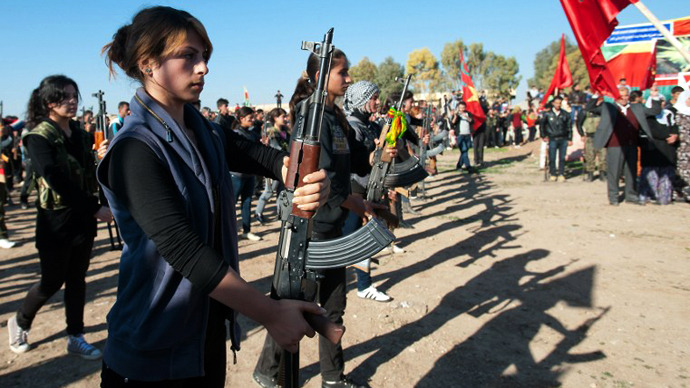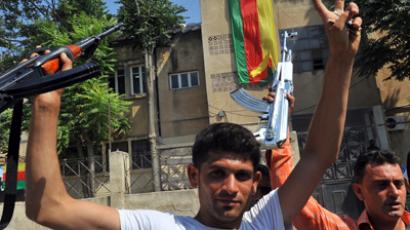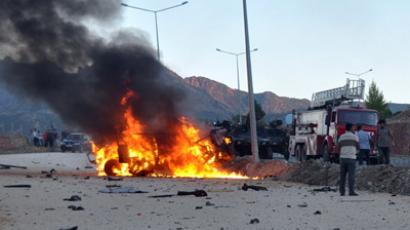Kurdish women in Syria create first female battalion

For the first time in Syria, 150 Kurdish women have set up a female-only battalion in the northern province of Aleppo, which has seen some of the heaviest fighting since the start of the Syrian uprising in early 2011.
The news comes from a statement by the Syrian Observatory for Human Rights on Saturday. While women have been known to fight alongside men in both pro and anti-regime forces – as well as the Kurdish militia, it is the first time they have formed their own fighting unit. An amateur photograph has been circulating on the internet, showing rows of women in military fatigues during training.
The announcement comes a month after the government set up paramilitary units called the National Defense Forces, which have actively been seeking to recruit women of all ages. This is testimony to the steady increase of women’s numbers in armed units. They are also becoming very useful in assisting male fighters, as they arouse less suspicion when transporting supplies and weapons.
"Women are fighting on all the fronts now, though it's possible the Islamist rebel ranks have the fewest women taking part in them," says Abdel Rahman of the Observatory.
The Kurdish question
The city where the battalion originated is Afrin, which in late
2012, was the last scene of fighting between Kurdish units and Arab
militias fighting the regime of President Bashar Assad. While a
number of Syrian Kurds remain neutral, they also exist on both
sides of the current Syrian split, getting invariably involved in
the violence.
The Kurds also happen to be the second largest ethnic group in
Syria, comprising three out of the 23 million of its total
population. They have been discriminated against in Syria by
several Arab regimes, often being denied citizenship, similar to
their plight in other states in the region. Their eventual goal
seems to be autonomy within a united Syria.
In January, at least 56 were killed in a week’s fighting in
north-east Syria between anti-Assad rebels and the long-oppressed
Kurdish minority, in which tanks and mortars had been used against
the Kurds.
While the rebel-on-government violence was to the west and south, the Kurds used the opportunity to set up schools and cultural centers, as well as armed militias and police units. The rebels have been blaming them for seeking self-rule by using the civil war to their advantage.
And many Kurds do tread carefully, knowing that President Assad’s failure to crush the rebellion could spell doom for their own ethnic group as well. They fear that the rebels would not honor the autonomy of various regions – especially one that holds around 2.5 billion barrels of Syria’s crude oil reserves.
Living predominantly in the mountainous regions of the north, the Kurds are situated next to the Turkish border. Their political group, the Democratic Union Party (PYD) is closely allied to the marginalized Kurdish faction in Turkey – the PKK. President Assad, according to some, has chosen to seize the opportunity for friendship with the Kurds, many of whom never joined the uprising against him. This could also play into his hands in light of the Turkish government’s opposition to his regime.
However, the Syrian Jihadists have directed huge blame at the Kurds for not participating in the uprising. Clashes between rebels and Kurds have intensified as soon as government forces withdrew from Kurdish-held areas in the summer of 2012. Often very little incidents at checkpoints had started major firefights between the Kurds and the rebels.
This split is one among several ethnic fault lines that run parallel to the Syrian revolution of 2011. In its two years, it has grown into a fully-fledged civil war and took more than 70,000 lives, according to UN estimates. It has also made more than 650,000 flee their homes, while over a million are displaced inside Syria.














